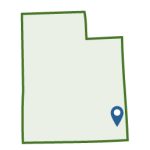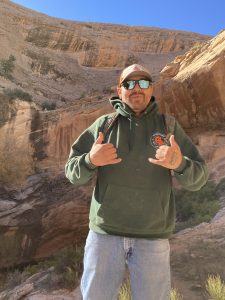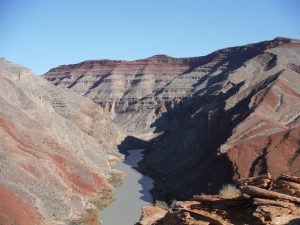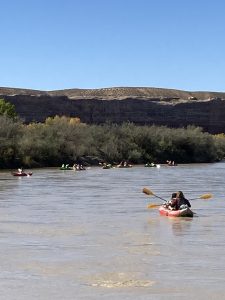

By Elliott Bochstein, RCAC Staff Writer
Southeast Utah’s towering mesas and lush canyons hold a special place in Louis Williams’ heart. As a Diné (Navajo) native, he grew up surrounded by the Indigenous languages and natural beauty of his ancestral land, instilling in him a profound respect for its fragile ecosystem and cultural heritage. Through his tour guide company, Ancient Wayves River & Hiking Adventures, Williams hopes to provide visitors with an unforgettable and immersive experience that showcases the profound interconnection between Native culture and the natural world, uplifting the voices of Indigenous peoples that have been marginalized for far too long.
“We offer cultural tourism, taking care of and passing down the stories we were taught, but it’s also about taking care of Mother Earth; we’re naturally conservationists,” Williams explained. “If you come with us, you’ll get to taste the Navajo Nation’s Indigenous foods and learn about our culture from our knowledgeable guides, some of whom speak the Diné language. We also teach visitors about the plants and animals that our ancestors have used for thousands of years, which sets us apart from other tour providers.”

Ancient Wayves showcases the rural Southwest’s majesty from a Diné perspective while incorporating stories from the Hopi, Ute and Zuni peoples. Williams’ decade-plus of experience as a seasoned tour guide in the region and familiarity with its local archaeology further enrich his tours. As the sole Indigenous-owned company authorized to guide visitors in the Bears Ears National Monument, Ancient Wayves is rooted in the Diné concept of Hozho, which emphasizes peace, harmony and balance, especially in relation to mental well-being. “Mental health or ‘Hozho’ is a big part of our culture, and it’s all about the interconnection of the natural and the mental, the physical and spiritual all interconnected into one,” Williams said. “We strive for Hozho as we’re hiking; when we’re not in Hozho, we’re out of equilibrium. Being out there is just awesome for mental health.”
For years, Williams dreamed of establishing the area’s first Indigenous-owned and operated outdoor recreation. However, he wasn’t confident such a venture could succeed until the fall of 2019, when he attended Rural Community Assistance Corporation (RCAC)’s Building Rural Economies (BRE) week-long business development workshop in Bluff, Utah. After learning business development fundamentals such as creating business plans and effective marketing strategies, Williams turned his long-awaited dream into a reality: on Feb. 19, 2020, Ancient Wayves was officially established as a Limited Liability Company (LLC).

Before Ancient Wayves had a chance to get off the ground, global health authorities announced that COVID-19 had developed into a full-blown pandemic. The Navajo Nation experienced some of the highest infection rates in the country, and the Bureau of Land Management (BLM) and Navajo Nation office closures made it impossible for Williams to obtain the permits required for land and river-based tours. It was a bleak moment. “We felt the blunt force of COVID more than anybody else because our whole economy shut down,” Williams said. “It was like the Twilight Zone. The streets were totally quiet besides the police driving around with their intercoms telling people to get inside. But that didn’t stop us.”
With his business reeling, Williams knew he needed help. He turned to RCAC’s Re-emerging Loan Fund (RELieF) program, which provides low-interest loans to small businesses affected by the pandemic. Thanks to the program, Ancient Wayves secured a $25,000 RELieF loan to cover expenses and renovate its facilities to provide guests with a safe and enjoyable experience. He also invested in much-needed river tour equipment to meet anticipated demand. RCAC BRE staff accompanied the loan with one-on-one small business coaching, which helped Williams tighten his internal bookkeeping and management processes and allowed him to adapt to the rapidly changing circumstances of the pandemic.

The end of lockdown measures in 2021 sparked a surge of enthusiasm for outdoor adventures, and Williams was primed to greet the spring tourism boom. That year, the Blanding Small Business Development Center (SBDC) also recognized Ancient Wayves’ success by giving it the coveted Client of the Year award. Williams now aims to expand his team of guides to ensure a diverse representation of Indigenous voices and cultures.
Williams would recommend RCAC to other entrepreneurs, both Native and non-Native. “We want to extend our appreciation to RCAC for helping out a Navajo Nation LLC,” he said. “RCAC is an important bridge, a great energy conductor, that can bridge us with outside resources and really help rural businesses to succeed.”
Visit https://www.tourancientwayves.com/ to learn more about Ancient Wayves River & Hiking Adventures.
For information, contact:
Juanita Hallstrom – Director, Loan Fund
(916) 447-9832 ext. 1065
jhallstrom@rcac.org
If you know a small business interested in RCAC’s lending or
small business coaching programs:
Download the Re-Emerging Loan Fund (RELieF) flyer
Visit our Small Business Coaching page
For information, call 1-855-979-7322
Learn more about RCAC’s RELieF Loan Fund
Fresh Eggs, Fresh Start:NDN Eggs Cracks Local Market with RCAC RELieF Loan
Mornings arrive early in Hoopa, a small community nestled amidst the towering redwoods of Humboldt County. This secluded rural California town, where the Hupa Indigenous people have stewarded the land for countless generations, marches to its own beat. Before the first light, Jack McNertney stirs. A member of the Yurok Tribe, he begins his day by caring for the 50 hens in his custom-built chicken coop. These hens are vital to his small business, NDN Eggs, providing the essential product that underpins his venture.
Rough and Ready Fire Protection District
Rough and Ready is an unincorporated census-designated place in Nevada County, California, with an estimated population of 905 people. The community was first settled during the 1849 gold rush and named after the Rough and Ready Mining Company. Land use is primarily rural-residential with some local commercial use. Home-based entrepreneurs, self-employed professionals, retirees and those who commute to Grass Valley, Nevada City and Beale Air Force Base support the local economy.
Flattening the impact – How RCAC’s RELieF program helped sustain a freelance journalist during the pandemic
Hawaii-based advocacy journalist Libby Leonard was leaning into her new career as a freelancer until the COVID-19 pandemic abruptly derailed her career, her finances, and seemingly her entire life. Rural Community Assistance Corporation’s (RCAC) Re-Emerging Loan Fund (RELieF) program ensured that she overcame the crisis and could continue writing powerful, community-centered stories for a global audience.
Sweet RELieF: RCAC loan helps woman-owned organic farm flourish amid pandemic
When COVID-19 struck, Rock Front Ranch in California’s Cuyama Valley faced an uncertain future. With a $25,000 loan from RCAC’s RELieF program and dedicated training from RCAC’s BRE team, this regenerative organic farm not only weathered the storm but emerged with an even stronger foundation for future success.
